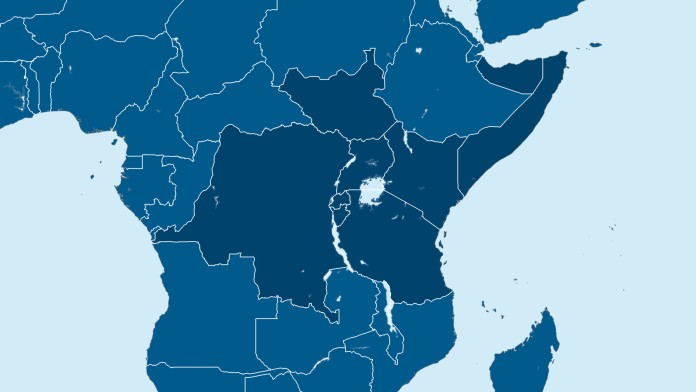
Stronger together: eight East African countries are relying on closer cooperation. Kenya, Tanzania and Uganda founded the East African Community (EAC) back in 2000, which Burundi and Rwanda joined in 2007, South Sudan in 2016, the D.R. Congo in 2023 and in 2024 Somalia became the eighth country to join. The member states have agreed upon a common market for goods, services, capital and work, and are aiming for a monetary union in the medium and long term. The EAC Secretariat in Arusha, Tanzania serves as a strategic coordinating body and is to be developed into a commission.
The East African countries share many challenges that are easier to tackle together, in particular the expansion of transport routes for regional connectivity and the effects of climate change. Inadequate healthcare systems are also a common concern. But it is not just the immediate basic needs that are not covered. The citizens of the East African countries are eager for information. There is a great need for independent publications.
The EAC is at the beginning of an integration process with the admission of the D.R. Congo. The EAC’s area has doubled, the population has increased by a third. Peace policy poses new challenges in view of the numerous conflicts in eastern Congo.
Close cooperation is also needed on the sustainable use of Lake Victoria, which borders five of the seven EAC countries. Water bodies are threatened by growing water consumption and climate change.
On behalf of the German Federal Government, KfW is supporting the EAC in deepening regional economic integration and is focusing on the following issues:
The state-of-the-art administrative building of the EAC Secretariat in Arusha, which was financed by Germany, manages the close cooperation between the seven countries. One of the common developmental challenges is the appallingly high level of child mortality: 85 out of 1,000 children do not reach the age of five. On behalf of the Federal Ministry for Economic Cooperation and Development (BMZ), KfW is supporting the EAC countries in the vocational training of midwives and nurses.
KfW also promotes a centre based at the University of Rwanda/School of Public Health (UR/SPH) in Kigali to train qualified specialists. KfW is also financing vaccinations in cooperation with Gavi, the Vaccine Alliance.
KfW is supporting the East African population’s desire for more independent sources of information by establishing an independent, private faculty of media sciences at the regional Aga Khan University in Nairobi, Kenya.
KfW and the European Union are also supporting the regional Lake Victoria Basin Commission (LVBC), which aims to ensure the long-term and coordinated use of the Lake Victoria basin. The entire catchment area of the lake is to be managed sustainably so that more and better water is available. At the same time, investments are being made in the infrastructure for wastewater treatment, which also has a positive effect on the quality of the lake water.
KfW supports the efforts of the EAC countries to co-ordinate and join forces to tackle the development challenges of the region.
KfW Office Dar es Salaam
Director KfW Office: Jennifer Wörl
Rufiji Street Plot 1668
House No. 20
Masaki Peninsula
Dar es Salaam
Tanzania
Phone: +255 22 26 00 648
Fax: +255 22 26 00 656
Share page
To share the content of this page with your network, click on one of the icons below.
Note on data protection: When you share content, your personal data is transferred to the selected network.
Data protection
Alternatively, you can also copy the short link: https://www.kfw-entwicklungsbank.de/s/enzBY1cR
Copy link Link copied